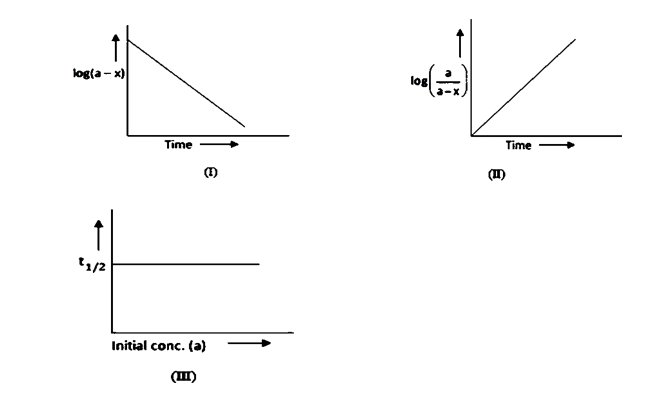Which of the following reaction is not of the first order ?
Inverison of sucrose in the presence of acid
Acid-catalyzed hydrolyiss of ethyl acetate
Hydrolyiss of tertiary butyl halide uisng alkali
Oxidation of Iɵ ion by S2O2−8 ion
The correct Answer is:D
To determine which of the following reactions is not of the first order, we need to analyze each reaction based on the definition of first-order reactions. A first-order reaction is characterized by a rate that depends linearly on the concentration of one reactant.
1. Understand First-Order Reactions:
- First-order reactions have a rate equation of the form:
Rate=k(A)1
- Here, k is the rate constant and (A) is the concentration of the reactant.
2. Analyze Each Reaction:
- Reaction 1: Inversion of sucrose in the presence of acid.
- This is a well-known first-order reaction because the rate depends on the concentration of sucrose.
- Reaction 2: Acid-catalyzed hydrolysis of ethyl acetate.
- This reaction is also first-order with respect to ethyl acetate as the rate depends on its concentration.
- Reaction 3: Hydrolysis of tertiary butyl halide using alkali.
- This reaction is first-order because the rate depends on the concentration of the tertiary butyl halide.
- Reaction 4: Oxidation of iodide ion by S2O2−8.
- This reaction is second-order because the rate depends on the concentrations of both iodide ions and S2O2−8.
3. Identify the Non-First Order Reaction:
- Among the reactions analyzed, the oxidation of iodide ion by S2O2−8 is the only reaction that is not first-order. It is a second-order reaction.
4. Conclusion:
- The reaction that is not of the first order is the oxidation of iodide ion by S2O2−8.
Final Answer:
The reaction that is not of the first order is the oxidation of iodide ion by S2O2−8 (Option 3).
---
- First-order reactions have a rate equation of the form:
Rate=k(A)1
- Here, k is the rate constant and (A) is the concentration of the reactant.
- Reaction 1: Inversion of sucrose in the presence of acid.
- This is a well-known first-order reaction because the rate depends on the concentration of sucrose.
- Reaction 2: Acid-catalyzed hydrolysis of ethyl acetate.
- This reaction is also first-order with respect to ethyl acetate as the rate depends on its concentration.
- Reaction 3: Hydrolysis of tertiary butyl halide using alkali.
- This reaction is first-order because the rate depends on the concentration of the tertiary butyl halide.
- Reaction 4: Oxidation of iodide ion by S2O2−8.
- This reaction is second-order because the rate depends on the concentrations of both iodide ions and S2O2−8.
- Among the reactions analyzed, the oxidation of iodide ion by S2O2−8 is the only reaction that is not first-order. It is a second-order reaction.
- The reaction that is not of the first order is the oxidation of iodide ion by S2O2−8.
The reaction that is not of the first order is the oxidation of iodide ion by S2O2−8 (Option 3).
Topper's Solved these Questions
- CHEMICAL KINETICSBOOK - CENGAGE CHEMISTRY ENGLISHCHAPTER - CHEMICAL KINETICSEXERCISE - Exercises Assertion-Reasoning
22 Videos
- CHEMICAL KINETICSBOOK - CENGAGE CHEMISTRY ENGLISHCHAPTER - CHEMICAL KINETICSEXERCISE - Exercises Integer
15 Videos
- CHEMICAL KINETICSBOOK - CENGAGE CHEMISTRY ENGLISHCHAPTER - CHEMICAL KINETICSEXERCISE - Exercises Multiple Correct
33 Videos
- CARBOXYLIC ACIDS AND THEIR DERIVATIVESBOOK - CENGAGE CHEMISTRY ENGLISHCHAPTER - CARBOXYLIC ACIDS AND THEIR DERIVATIVESEXERCISE - Exercises Archives (Analytical And Descriptive)
34 Videos
- COORDINATION COMPOUNDSBOOK - CENGAGE CHEMISTRY ENGLISHCHAPTER - COORDINATION COMPOUNDSEXERCISE - Archives Subjective
18 Videos
Similar Questions
Which of the following reaction (s) is / are of the first order ?
View SolutionWhich of the following graph is correct for a first order reaction ?
View SolutionWhich of the following is/are correct for the first order reaction?

View SolutionWhich of the following expression is correct for first order reaction? Ao refers to initial concentration of reactant
View SolutionWhich of the following expresison is correct for first order reaction (c0 refers to initial concentration of reactant)
View SolutionWhich of the following is/are correct for the first order reaction ? (a is initial concentration of reactant, x is concentration of the reactant reacted and t is time)

View SolutionWhich of the following is/are correct about the first order reaction ?
View SolutionWhich of the following is correct for zero and first order reactions respectively, where 'a' is initial concentration of the reactant ?
View SolutionWhich of the following order is correct for the first ionozation potential of B,C, and N?
View SolutionWhich of the following is correct for a first order reaction ?
View Solution
